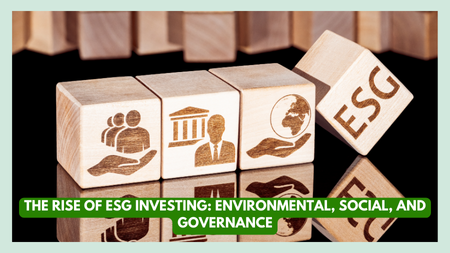No products in the cart.
Financial, Stock Market
The Explosive Rise of ESG Investing: Environmental, Social, and Governance in 2024
Overview
In the global financial markets, environmental, social, and governance (ESG) investing has emerged as a transformative force, reflecting the increasing awareness of the importance of ethical and sustainable business practices. As more investors recognize the impact of corporate actions on the environment, society, and governance structures, ESG-focused investments have gained momentum, reshaping the way capital is allocated across various industries.
In the Philippines, ESG investing is rapidly growing as both institutional and retail investors seek to align their portfolios with values that promote corporate social responsibility, environmental sustainability, and strong governance standards. The demand for ethical investment strategies is being fueled by factors such as climate change awareness, regulatory developments, and shifting consumer preferences toward responsible business practices. Companies that prioritize ESG principles are more likely to attract long-term investors, mitigate financial risks, and maintain resilience in an evolving global economy.
This discussion explores the rising popularity of ESG investing in the Philippines, highlighting the driving forces behind this shift, the challenges that investors and businesses face in adopting ESG criteria, and the broader economic and social implications of integrating ESG principles into investment strategies. As the financial landscape continues to evolve, ESG investing is expected to play a critical role in fostering sustainable growth, enhancing corporate accountability, and contributing to a more inclusive and responsible economy.
Comprehending ESG Investing
ESG (Environmental, Social, and Governance) investing is a strategy that evaluates companies based on their performance in these three key areas. It goes beyond traditional financial analysis by incorporating ethical and sustainability considerations, helping individuals and institutions allocate capital toward businesses that prioritize long-term value creation while minimizing negative impacts on society and the environment.
By integrating ESG factors into decision-making, investors can identify companies that are not only financially sound but also aligned with sustainable and responsible business practices. This approach can lead to stronger risk management, resilience against regulatory changes, and potential long-term growth as businesses increasingly adopt sustainable strategies.
Environmental Factors
The environmental component of ESG investing examines how a company interacts with the natural world. It evaluates efforts to reduce carbon emissions, manage waste efficiently, conserve water and energy, and implement sustainable sourcing practices. Companies with strong environmental policies are proactive in mitigating climate change risks, investing in renewable energy, and reducing their ecological footprint.
Industries such as renewable energy, electric vehicles, and sustainable agriculture are at the forefront of environmentally responsible business models, attracting investors who seek to support long-term environmental sustainability while also generating financial returns. Businesses with poor environmental practices, on the other hand, may face regulatory penalties, reputational damage, and declining investor confidence.
Social Factors
The social aspect of ESG investing focuses on how a company manages relationships with employees, suppliers, customers, and the communities in which it operates. This includes workplace diversity and inclusion, employee well-being, fair wages, ethical supply chain management, and corporate social responsibility initiatives. Companies that foster strong social values tend to experience higher employee satisfaction, increased brand loyalty, and improved long-term performance.
Businesses with ethical labor practices and strong community engagement often earn a competitive edge by building trust with stakeholders. Conversely, companies with poor social policies may face reputational risks, consumer backlash, or workforce-related challenges that could impact financial performance.
Governance Factors
Governance in ESG investing refers to the leadership structure, policies, and ethical standards within a company. It includes evaluating board diversity, executive compensation, transparency in financial reporting, regulatory compliance, and anti-corruption measures. Strong governance ensures that a company operates with integrity, accountability, and respect for shareholder rights.
Companies with robust governance structures are more likely to avoid financial scandals, regulatory fines, or conflicts of interest that can negatively impact investors. On the other hand, weak governance can lead to mismanagement, poor decision-making, and long-term instability.
Why ESG Investing Matters
ESG investing is gaining traction as consumers, regulators, and investors demand more corporate responsibility. Companies that integrate ESG principles are often better positioned to manage risks, attract investment capital, and drive long-term profitability. Additionally, as sustainability becomes a global priority, businesses that fail to meet ESG criteria may face declining market relevance and increased financial risks.
By considering ESG factors, investors can align their financial goals with their values while supporting companies that prioritize ethical, sustainable, and socially responsible practices. This approach not only promotes corporate accountability but also contributes to a more resilient and sustainable global economy.
Philippine ESG Investment’s Motivating Factors
Global Patterns and Regional Acceptance
The global surge in ESG investing has had an impact on the Philippine market. Local businesses and investors are embracing ESG principles more frequently to attract global capital and improve their competitiveness, while international investors are placing a higher priority on sustainability.
Regulatory Assistance
Government and regulatory agencies in the Philippines have backed ESG initiatives. Publicly traded firms are required by the Securities and Exchange Commission (SEC) of the Philippines to disclose their ESG practices, by standards on sustainability reporting. ESG integration into company plans is encouraged by this legislative framework, which also promotes responsibility and openness.
Increasing Knowledge and Customer Requirements
Filipino customers are becoming more conscious of the value of ethical and sustainable business operations. Companies are being compelled by this shift in customer preferences to implement ESG practices to satisfy the demands of consumers who care about the environment and social justice.
Opportunities for Investments
Investors are aware that businesses with robust ESG policies frequently perform better over the long run in terms of risk management and resilience. Opportunities in industries that are expected to flourish in the Philippines, like green technology, sustainable agriculture, and renewable energy, can be found through ESG investment.
ESG Investing’s Effect on the Philippine Market: Enhanced Corporate Governance
The growing interest in ESG investing is pushing Philippine businesses to enhance their social and environmental policies and fortify their governance structures. This change may result in enhanced stakeholder engagement, better risk management, and more sustainable corporate operations.
Research on Market Performance indicates that organizations exhibiting robust ESG practices typically exhibit greater resilience and yield superior financial returns in the long run. Businesses that implement sustainable practices may experience improved market performance and draw in a wider investor base as ESG investment picks up steam in the Philippines.
Advantages for the Environment and Society
Positive social and environmental results are promoted by the emphasis placed on ESG standards. Businesses that invest in renewable energy, for example, help to lower the nation’s carbon footprint, while those that have strong social policies can enhance working conditions and the well-being of the community.
Obstacles & Difficulties
Information and Summaries
The availability and quality of data is one of the major obstacles to ESG investment. Even with the Philippine SEC’s mandate for sustainability reporting, accurate evaluation of ESG performance still requires consistent measures and trustworthy data.
Knowledge of the Market
Even while more local investors and businesses are becoming aware of ESG investing, there is still a knowledge gap in this area. To increase awareness and acceptance of ESG principles in the Philippine market, lobbying, and education are crucial.
Temporal Focus
The conventional emphasis on immediate financial results may act as a deterrent to ESG investing. Companies and investors alike must adopt a long-term outlook that prioritizes resilience and sustainable growth.
Examples and Case Studies
Ayala Enterprise
One of the biggest corporations in the Philippines, Ayala Corporation, has led the way in ESG integration. The business is dedicated to improving corporate governance, encouraging inclusive growth, and lowering its carbon footprint. Ayala is investing in affordable housing, social entrepreneurs, and renewable energy sources as part of its environmental activities.
First Gen Company
Another illustration of ESG leadership in the Philippines is First Gen Corporation, a well-known energy provider. Geothermal, hydro, wind, and solar energy are among the clean and renewable energy sources that the organization specializes in. First Gen is positioned as a major role in the nation’s shift to a low-carbon economy because of its dedication to sustainability and environmental care.
ESG Investing’s Future in the Philippines
Growing Up in Institutions
It is anticipated that institutional investors, such as insurance firms and pension funds, will be crucial in promoting ESG investing in the Philippines. These organizations have the power to direct a sizable amount of cash toward ethical and sustainable companies by integrating ESG standards into their investment procedures.
Technological Progress
Technological developments such as artificial intelligence and big data analytics can improve the gathering and interpretation of ESG data. These resources can offer a more in-depth understanding of business procedures and support investors in making wiser choices.
Cooperation and Joint Ventures
Promoting ESG investing requires cooperation between a range of stakeholders, including governmental bodies, businesses, and non-governmental groups. To promote sustainability and ethical investing, partnerships can help solve shared difficulties, exchange best practices, and encourage innovation.
In Summary

The surge in ESG investment in the Philippines is indicative of a worldwide movement towards sustainable development and moral business conduct. Encouraged by increased awareness, legislative support, and the realization of long-term value, ESG investment has the potential to revolutionize the Philippine market. Businesses can become more competitive, investors can get higher risk-adjusted returns, and society can gain from better social and environmental outcomes by adopting ESG principles. The Philippines stands to gain a great deal from this sustainable investment strategy as ESG investing gains traction.
If you like reading this, please like and share my page, DIARYNIGRCIA PAGE.
Questions or suggestions, send them to diarynigracia@gmail.com
You may also follow my Instagram account featuring microliterature, visit DIARYNIGRACIA INSTAGRAM.
READ MORE RELATED BLOGS!
READ MORE AND SHARE!
TSOK Chronicles: Unleashing Passion, Dedication, and Excellence in 2024
2023 Your Practical Wedding Guide
Investments and Finance Ultimate Guide
If you like this article please share and love my page DIARYNIGRACIA PAGE Questions, suggestions send me at diarynigracia @ gmail (dot) com
You may also follow my Instagram account featuring microliterature #microlit. For more of my artworks, visit DIARYNIGRACIA INSTAGRAM
DISCLAIMER
Please note:
The information provided in this financial analysis blog entitled "The Explosive Rise of ESG Investing: Environmental, Social, and Governance in 2024" is for informational purposes only based on my study and research. Furthermore, personal research may also be conducted as information presented my change over time. While I strive to provide accurate and timely information, I make no guarantees regarding the reliability, accuracy, and strongly relies on time and availability of the economy at time of writing. Investments carry inherent risks, and it is essential to conduct your own research or consult with a licensed financial advisor before making any investment decisions. The views, opinions, and valued research and analysis presented are those of the author and may not reflect the official policy or position of any company or financial institution.
📷 MEDIA CONTENT DISCLAIMER All rights and credits reserved to its respective owner(s). If you are the main copyright owner rather than the one mentioned here on this content, contact us to claim credit or remove content.


:max_bytes(150000):strip_icc()/ESG-final-fc9c8799d2d34234a895cbab621c21ad.png)
Peace and love to you.